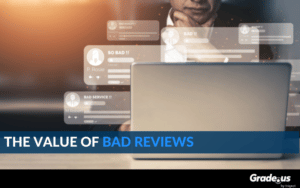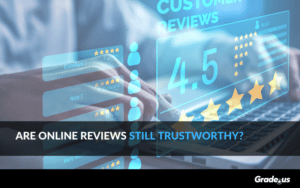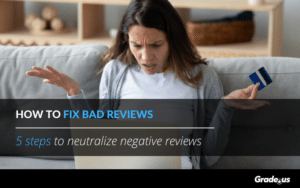If you read my interview with Jay Baer, or have picked up a copy of his book Hug Your Haters (see Garrett's review here), you know it's a great idea to answer every single review you get. The way you handle and thoughtfully reply to negative reviews matters the most.
It's not just about graceful public customer service, (though demonstrating your care, concern, and willingness to address complaints goes a long way towards mitigating those reviews.)
It's not just about getting your "hater" to change the review back to something more positive—though that's a pretty great outcome, too.
It's about turning that former hater into your biggest cheerleader. And it happens! Believe it or not, it's still rare for businesses to address complaints in any kind of a satisfactory way. If you can pull it off, you can usually instill a, "Whoa, they're awesome" feeling in your customer.
The extra effort pays off when that person starts recommending you as their business-of-choice, even if you never hear or see them do it. It's still word-of-mouth advertising. Still dollars in your pocket.
But what do you say? And how do you say it? Not all businesses find that so easy to figure out. I've put these industry specific review response templates together to give you a boost.
Templates, NOT form letters(!!)
Before we jump in, I want to explain how you're meant to use these industry specific review response templates.
I've seen places that obviously copy and paste the same answer to every negative review. Over and over again.
If you do that, you achieve the opposite of what you hope to achieve. You look bored and indifferent. It smacks of your lowest-paid employee sitting at a desk "answering" reviews while chewing gum, eyes glazing over. Her brains and soul leached away bit by bit with every Control-V. It's all about that empathy.
You can't just avoid defensiveness. You have to put yourself in your customer's shoes.
You need to truly understand why this incident is stuck in their craw.
This doesn't just give you some idea of what to say, it reveals how to address the situation. Sometimes comping meals or offering discounts isn't enough. It helps, but it's not enough if it's not clear that you're going to address the situation.
For example, my #1 pet business peeve is people giving me incorrect information. It's the swiftest way to get my blood boiling.
Do I want a free whatever? No. I want you to tell me you'll train your dadgum employees better in the future. And I want you to address whatever situation your employees created by leading me astray.
Usually, companies mishandle that second bit.
They launch themselves straight into the second swiftest way to get my blood boiling.
Which is for your employee to tell me, "even though our business was the one who messed up, in order for you to get relief from this situation we created you're going to have to inconvenience yourself."
Whether it's by going all the way down to your place of business to cancel my service or by paying even more money.
And it happens ALL THE TIME.
Do I want $100 off? No. I want you to just cancel my freaking account from where you're standing so I don't have to get in the car. Or to absolutely waive whatever looney-tunes fee you're trying to charge me for your mistake.
So when you compose your response you always need to ask yourself: "Hey, is this really dealing with the problem, or am I just offering out some sort of sop?"
How did you arrive at 9 templates?
I'm adopting Baer's approach that you answer twice (and only twice). The first template is for your initial review response.
The second one is what you use if your customer updates his or her review in a positive way after you address the situation.
The third one is what you use if your customer continues to gripe in the review. A way to gracefully exit the situation without escalating it (and making yourself look bad in the process).
I've picked three industries which sort of offer a decent variety of situations that can easily be applied to other industries.
Home Services Industry Review Response Template Series
The impression a bad review can leave potential clients with:
"Just another lying, cheating contractor who is going to mess up my house and drain my wallet."
The impression you want to create:
"Sometimes things happen, but I'm a caring professional who will work hard to make it right."
Who should leave the review response:
Ideally, it should come either from the owner, or from the professional who worked directly on the home. Your office person can do it, but if that's the case make sure you give that person the power to make it right.
Here are some additional home services review management tips.
Agency Note:
If you’re running review management for clients as an agency, there was recently a thread in the LocalSearch Forum whether you should respond as the owner or as yourself.General consensus was that it’s a better user experience if you reply as the owner, even if your instinct is to go into transparency overdrive.
Review Response Template #1 - Initial Template
Hey [Reviewer Name],
I'm [sorry/disappointed/concerned] to hear that [I/technician] [describe the specific problem, and the impact it had on the customer.] This isn't normally how we do business!
I'll call you by the end of the day today to work out a solution.
[Owner Name]What it might look like:
Hey Carol,
I'm disappointed to hear Brad didn't show up on time when he came to fix your plumbing issue. I know that means you had to go without water much longer than you should have. What a pain!
I'd like to assure you this was a one-off incident. We expect all of our plumbers to be at our customer's home promptly, and for them to be prepared to work hard when they get there.
I'll call you by the end of the day today to work out a solution.
-Tony (Owner of Tony's Plumbing)
Review Response Template #2 - Reviewer Changed the Review
Dear [Reviewer Name],
Thanks so much for [updating your review/taking the time to talk about how we addressed your problem, etc.] I'm really happy we could resolve [problem] for you. [Something else you've done to rectify situation].
-[Owner Name]
What it might look like:
Dear Carol:
Thanks so much for taking a moment to post this update. I'm so glad we were able to work this out! I've also taken the opportunity to speak to Brad about this incident and have been assured it will not happen again.
-Tony
Review Response Template #3 - Reviewer Continues to Badmouth Your Company
After receiving [reviewer name]’s complaint, we contacted [him/her] to [whatever you did to rectify the situation]. We have also [taken additional steps], and will continue to use the feedback we receive to serve our customers better.
What's going on here:
Rather than give you another fully fleshed out fictional example (you've got the point by now anyway), I want to take a moment to talk about why the response is set up this way.
At this point, you're not really talking to the reviewer anymore. This customer isn't coming back anyway.
You're talking to everyone who might read the review. You want to stay calm, and you don't want to be defensive about it, but you're doing your best to show you've done all a reasonable person would expect you to do about the problem. It gives you a little credit while taking a little credit from Gripey McCrazypants.
On its own, it won't help much if you're drowning in 1-star reviews, but if you've mostly got good reviews, it will tell readers to give more credence to those.
Legal Industry Review Response Template Series
The impression a bad review can leave potential clients with: "Just another greedy lawyer who doesn't care about me at all."
The impression you want to create: "The legal industry can be tough, but I care deeply about my clients and fight for their success in a professional and reliable manner."
Who should leave the review: ideally, it should come from the lawyer who handled the case. There's almost nobody else who matters here. When responding to the review, as a lawyer it's essential consider what is confidential when it comes to the relationship with the client. We discussed the rules and laws that lawyers should consider when it comes to public facing review sites.
We've got additional legal industry review management tips for you as well!
Review Response Template #1 - Initial Template
I am deeply concerned to learn I [disappointed you/let you down/distressed you] in this fashion.
It wasn't my intention to [cause problems/make you feel ignored]. [Now, add a description of what happened, and why]. I'd be happy to jump on a call to talk to you about it a little more if you'd like to discuss this with me.
[Lawyer Name]Why isn't there an offer to rectify the matter in this template?
Because it's not that appropriate for lawyers to run around giving discounts and freebies. In your case, you want to stay professional and explanatory. But you do offer to talk, because sometimes your client just wants to be heard.
What this might look like:
Here's an example of what using this template might look like, from an actual lawyer who is using something very close to it.

Notice how Witherite even included a reason regarding why the action the reviewer is complaining about benefits him. That's a big help.
Review Response Template #2 - Reviewer Changed the Review
Thank you so much for your [amended/updated/addendum to your] review.
I'm happy we were able to [resolve this matter/bring it to a successful conclusion/reach a satisfactory outcome].
-[Lawyer Name]
Review Response Template #3 - Reviewer Continues to Badmouth Your Firm
That's it?
Yeah. You've already explained yourself pretty thoroughly in the initial response. At this point, more conversation is detrimental. If the reviewer presents new information in the next go-round, you can try for a version of Template #1 again, but at this point it may be better to just let it go.
Hospitality Industry Review Response Template Series
The impression a bad review can leave potential guests with: "If I go here, I'm going to be uncomfortable."
The impression you want to create: "Our guests are our first priority, and we always take steps to make our guests as comfortable and as happy as we possibly can."
Who should leave the review: you're reasonably lucky. Any member of the hotel staff can do this for you.
Want more insights? Check out my hospitality industry review management tips.
Review Response Template #1 - Initial Template
We're so sorry you had a bad experience at our establishment.
Normally we work hard to [keep it clean/maintain our property/be polite to every guest/produce incredible food, or whatever else the problem was].
Please reach out to us directly at your earliest convenience so we can address this situation!
[Your name and position]The impression a bad review can leave potential guests with: "If I go here, I'm going to be uncomfortable."
The impression you want to create: "Our guests are our first priority, and we always take steps to make our guests as comfortable and as happy as we possibly can."
Who should leave the review: you're reasonably lucky. Any member of the hotel staff can do this for you.
Want more insights? Check out my hospitality industry review management tips.
Hospitality Industry Note:
You have them reach out to you because the hospitality industry, more than any other industry, contends with a bunch of people who seriously smell blood in the water when it comes to reviews.You might comp a reviewer a free night at one of your hotels, but you don’t want to give the Internet at large the impression you’ll do that every time someone raises a fuss. Of course, you don’t have to get that crazy. Sometimes a nice handwritten note with a $15 Starbucks gift card will get the job done too.
Either way, you probably don’t want to publish what you’re giving away, if anything, to turn an unhappy customer into a happy one.
What it looks like:

Review Response Template #2 - Reviewer Changed the Review
We're so glad we were able to resolve [the situation] to your satisfaction!
We look forward to having you as a guest again.
[Your name and position]Short, sweet, and simple...
Because in this case, it doesn't have to be anything else! You can of course change up the language. Anything to ensure you're not creating the dreaded form-letter response.
Review Response Template #3 - Reviewer Continues to Badmouth Your Establishment
On [date] we offered [Reviewer Name] [specific solution in vague terms]. We have also taken [step] and [step] to make sure the problem does not arise again for any of our other guests.
Why address the solution in this template?
Though you still don't want to get into specifics, you still need to be able to prove you did something. If you comped a night you might say, offered a significant refund or offered a large discount. If you sent a gift card or a gift basket you might reference that in vague terms.
Again, though, you're not even talking to the reviewer at this point. You're talking to everyone else who might read the review, to make sure they understand you've done all you could really be expected to do.
Review response frameworks adaptable for other industries
Obviously, there's a lot more than 3 industries out there. If I tried to cover all of them, I'd be writing a book, not a blog post.
But the format isn't that different for other industries. The main thing is to ask yourself what someone reading the negative review might think, versus the impression you want to give. Then craft a response that acknowledges, emphasizes, and begins to either rectify or explain the situation, as is appropriate.
Obviously if you do post, you're going to contact the customer (versus asking the customer to contact you) make sure you actually do so. And if you tell the customer to contact you, make sure everyone who might answer the phone knows what's going on.
Most of all, don't panic. You've got many more chances to earn great reviews, and a bad one isn't the end of the world...especially if you respond right.
About the Author
Raney C. Hudson
Raney C. Hudson is an independent content consultant with a 10+ year track record in the digital marketing industry.










